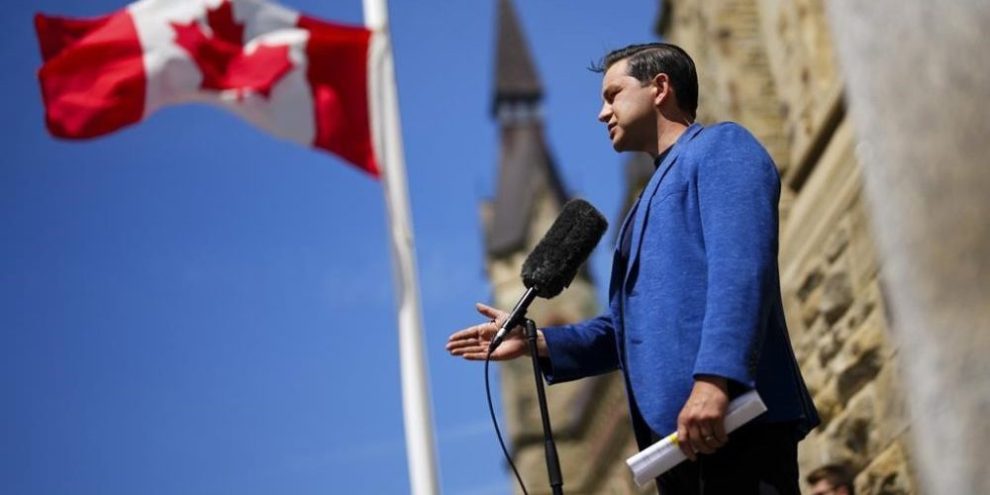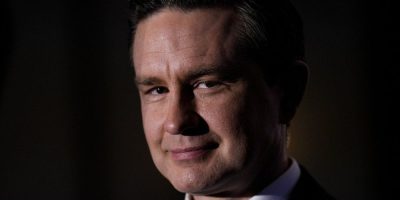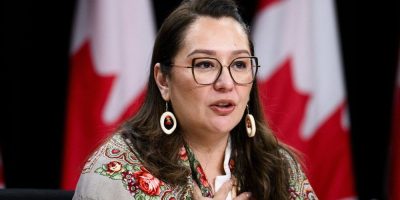
Stephanie Taylor - The Canadian Press
As conservative premiers change the rules around pronoun use in schools, members of the federal Conservative grassroots want Pierre Poilievre to wade further into the debate around gender expression.
A submission to next month's policy convention in Quebec City proposes discussion of a Conservative government prohibiting "life-altering medicinal or surgical interventions" for those under 18 who are looking to transition.
The pitch is similar to ones found across the United States, including in Florida where Gov. Ron DeSantis signed a bill in May banning gender-affirming care for transgender youth — a move many health professionals, parents and advocates for LGBTQ youth say places them at greater risk for suicide and depression.
As federal Conservative leader, Poilievre has primarily focused on the cost-of-living crisis gripping millions, high-interest rates and a lack of affordable housing.
But parts of his base are hoping he will broaden his Opposition agenda to include more of a focus on social issues.
Asked Wednesday about his openness to outlawing gender-affirming care for children, Poilievre told reporters: "I haven't had a chance to study all the proposals at our convention, but we'll take a careful look at every proposal and decide whether or not it lines up with our platform."
Poilievre has not on his own veered into the territory of talking about gender-related matters, except when asked. That includes his response to New Brunswick's decision to change a policy that made it mandatory for teachers to use a child's preferred pronouns without parental consent. Poilievre said Prime Minister Justin Trudeau should "butt out" of decisions by provinces and parents.
On Tuesday, Saskatchewan adopted a similar policy, which the province's advocate for children has said may harm the rights of kids, calling it concerning.
Manitoba Progressive Conservative Leader Heather Stefanson also promised that if re-elected, her government would give more "parental rights" to families when it comes to the curriculum and presentations by outside groups at schools.
The term "parental rights" is increasingly used in social conservative circles and messaging to refer to the concerns some families and individuals have about what schools teach children about sexual orientation and gender expression. It has a significant focus on policies around transgender and nonbinary students.
It is an issue that has picked up steam within the federal Conservative grassroots since the party's last gathering, held virtually, under former leader Erin O'Toole.
In the contest to replace him, which Poilievre won by a landslide last September, former contestant and rural Ontario Conservative MP Leslyn Lewis vowed to introduce a bill protecting "parental rights."
A second gender-related policy pitch Conservatives are expected to discuss next month has to do with the issue of "single-sex spaces" in areas ranging from washrooms to prisons and sports.
It is related to the belief underpinning legislation in the U.S. that seeks to ban transgender individuals from using the bathroom of their choosing, rather than one aligned with the sex they were assigned at birth.
Other policy submissions have to do with protecting free speech on university campuses and in public spaces, housing affordability, national defence, developing Canada's natural resources and a faster recognition of immigrant credentials, which is a priority for Poilievre.
Fred DeLorey, who ran the Conservative election campaign in 2021, says policy conventions are crucial for the party's grassroots members, who show up to have their voices heard and help influence the direction of the party ahead the next federal election.
He pointed to the party's founding convention in 2005, the first held after the Progressive Conservatives merged with the Canadian Alliance two years earlier. It laid the groundwork for Stephen Harper's platform in the 2006 election, which made him prime minister.
"I would expect to see much of that replicated here," said DeLorey.
"Pierre Poilievre has, I would say, more control over this party than any other previous leader ever has had in terms of his popularity within the party."
Poilievre won the leadership race on the first ballot last year with nearly 70 per cent support. His campaign signed up more than 300,000 new members using a slick communication style, savvy social media presence, countless rallies and pledges to bring more freedom to Canadians by way of opposing COVID-19 vaccine and other pandemic-related public health mandates.
Policy debates around abortion access and equal marriage are not new to Conservative party conventions, but DeLorey said discussions around gender identity appear to be new territory for a leader to navigate.
Still, with Poilievre's favourability ratings through the roof among party members, he does not anticipate anything passing without the leader's blessing.
"Mr. Poilievre — this is his party."
Liberals are expected to be watching what happens with the policy debate closely, ready to pounce on any controversy. That is what happened at the 2021 convention, when members rejected adding wording to a policy declaration to recognize that "climate change is real" and that the party is "willing to act."
The move was seen as a blow to O'Toole, who at that time was promising to develop a serious environmental plan.
The Sept. 7 to 9 Conservative policy convention comes after a summer that has seen the governing Liberals lag in the polls and then try to right the ship through a renewed focus on the housing and cost-of-living crises.
Poilievre has spent the past two months attending events across Canada, sporting a more casual look, without glasses, and taking a softer tone in the hope that he can appeal to Canadians who are ready for change, but not necessarily ready for him.
The party views the convention as a chance to fire up the membership ahead of the next election, but also to showcase Poilievre as Canada's next prime minister.
"One thing a lot of people are asking: What is he going to do if he wins?" said DeLorey.
"The policy declaration that comes out of (the convention) is the blueprint."
banner image: The Canadian Press





